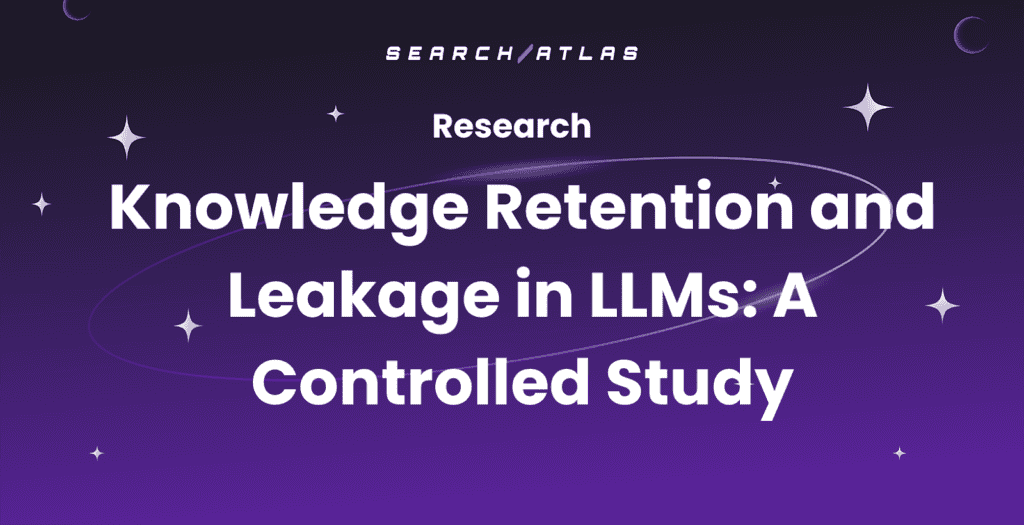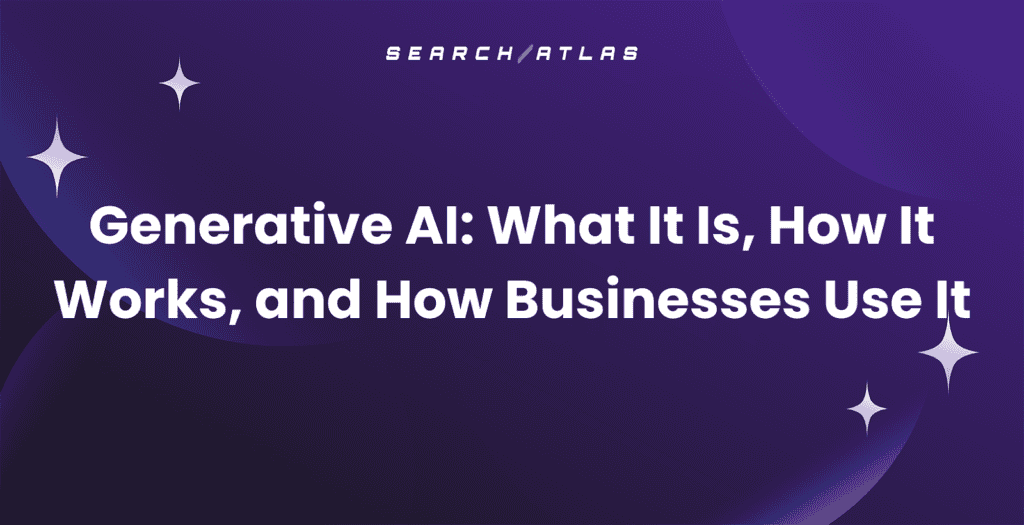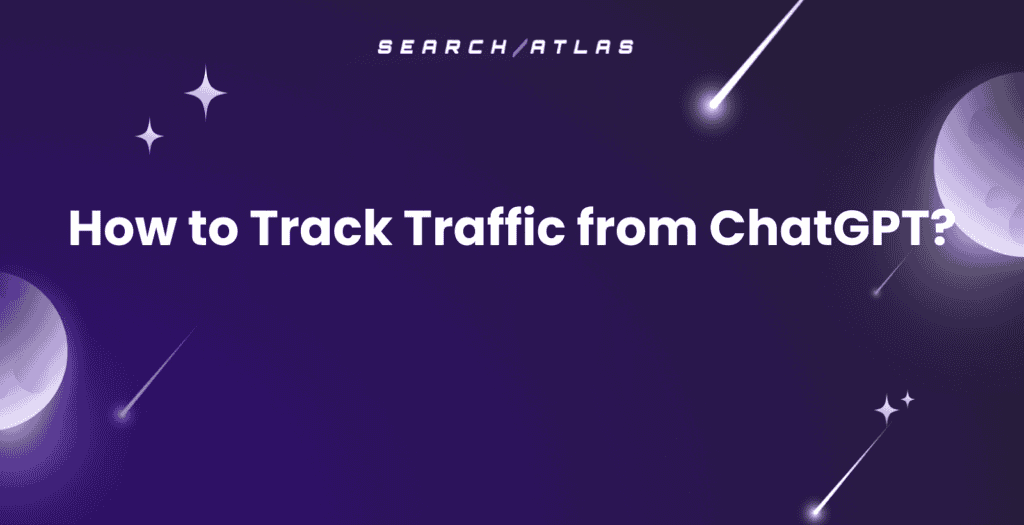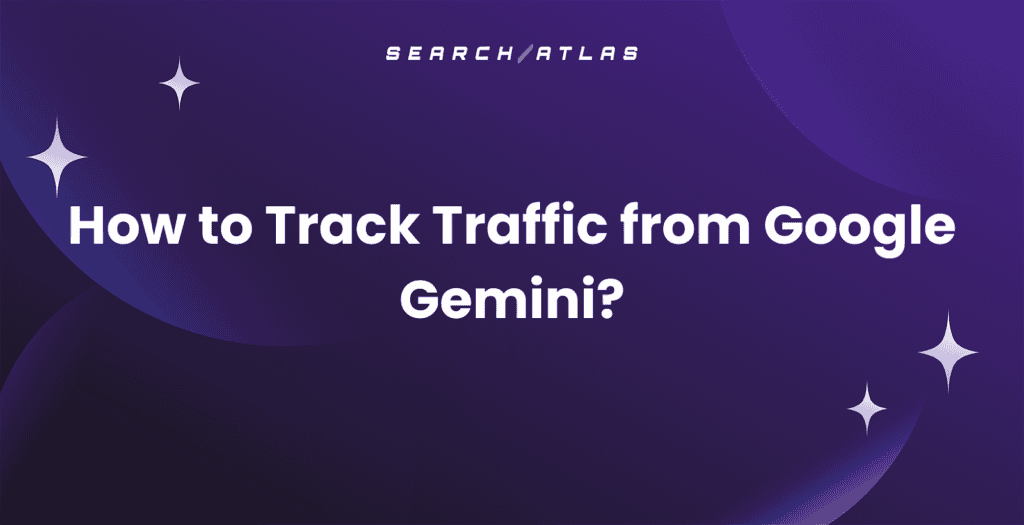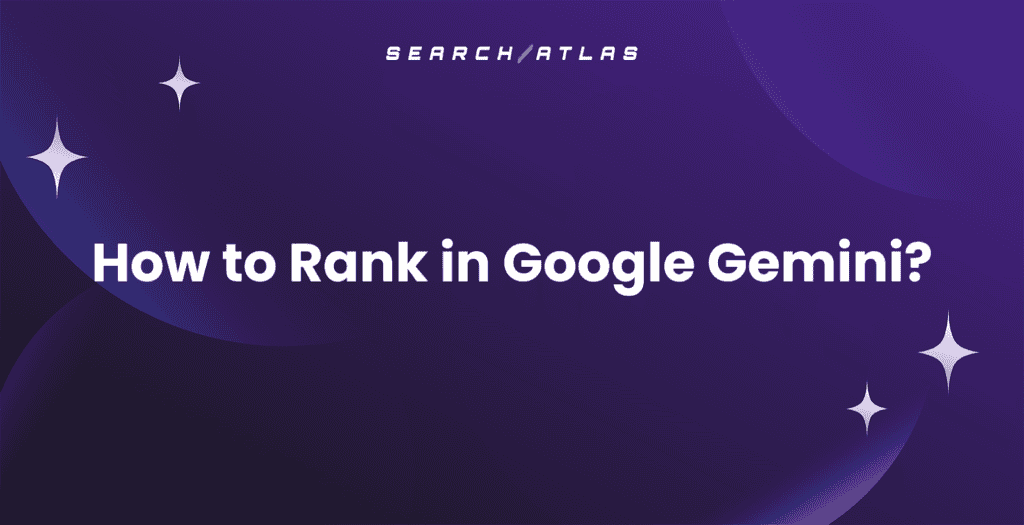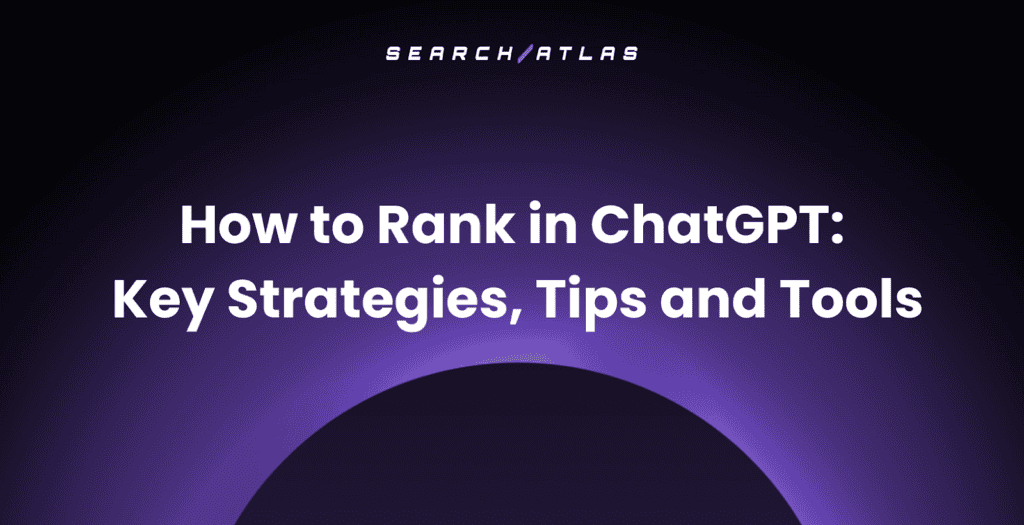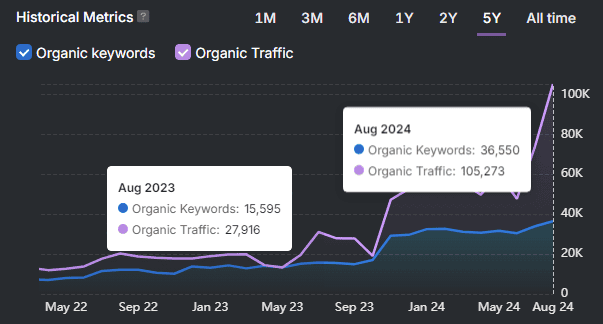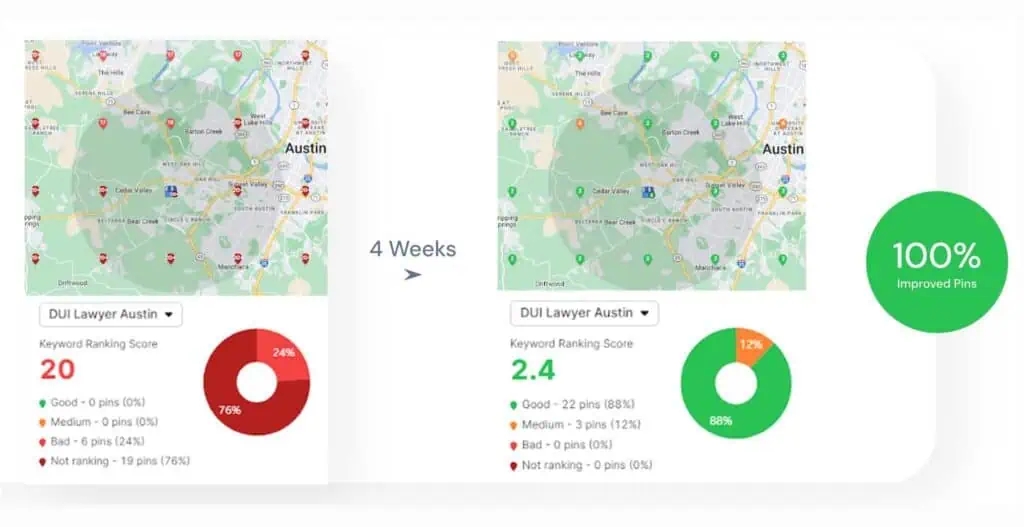SE Ranking alternatives are SEO tools that replace SE Ranking in core functions, such as rank tracking, keyword research, SEO audits, content optimization, and reporting, with equal or better performance. Alternatives to SE Ranking range from all-in-one SEO platforms to affordable niche tools that outperform SE Ranking in specific use cases like content scoring, white-label reporting, or PPC analysis.
Search Atlas, Semrush, and Serpstat are the best alternatives to SE Ranking in 2025. SEO professionals look for SE Ranking alternatives like these that offer stronger rank accuracy, better UX, GSC-native tracking, AI-powered optimization, or scalable reporting for multi-domain campaigns.
Common reasons for switching from the SE Ranking tool include insufficient data depth, missing PPC visibility, and outdated content tools that slow execution across large content programs.
The 15 best SE Ranking alternatives for every budget and SEO use case are listed below.
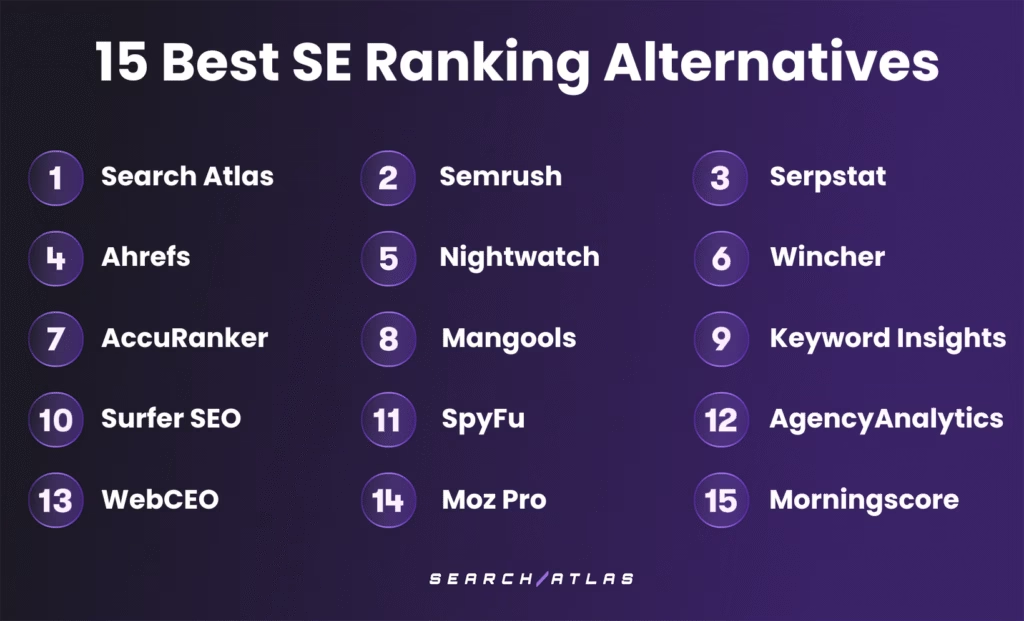
Best All-in-one SEO Tool Alternatives to SE Ranking
1. Search Atlas
Search Atlas is an all-in-one SEO and PPC platform built for SEO agencies and professionals that manage rankings, content, audits, backlinks, and local visibility at scale. Search Atlas SEO platform connects directly to Google Search Console (GSC), Google Business Profile (GBP), and Google Ads. Search Atlas real-time verified metrics replace the modeled keyword data and third-party crawl estimates that SE Ranking offers. SE Ranking requires manual keyword entry and shows delayed SERP positions based on proxy scraping.
Compared to SE Ranking, Search Atlas is better for real-time rank tracking, AI-powered content workflows, backlink outreach automation, and local SEO execution.
Every Search Atlas plan includes OTTO SEO, an AI assistant that executes technical fixes, optimizes metadata, restructures internal links, manages backlinks, and updates Google Business Profiles. SE Ranking flags SEO issues but does not resolve them. OTTO SEO applies changes directly using JavaScript or WordPress, which closes a gap that SE Ranking leaves open for in-house teams.
In content workflows, Search Atlas outperforms SE Ranking in every stage. Search Atlas Content Genius provides real-time SERP comparisons, entity scoring, NLP guidance, and topic structure based on current top-ranking pages. SE Ranking includes basic on-page checks but lacks live SERP overlays, internal link recommendations, or semantic scoring models.
The Search Atlas SCHOLAR engine evaluates content using Google-aligned models like EAV and SPO triples, which SE Ranking does not support.
For rank tracking, Search Atlas pulls live positions from GSC with full device and geo-segmentation. Search Atlas includes heatmaps for local map pack visibility, keyword volatility tracking, and zero-click position mapping.
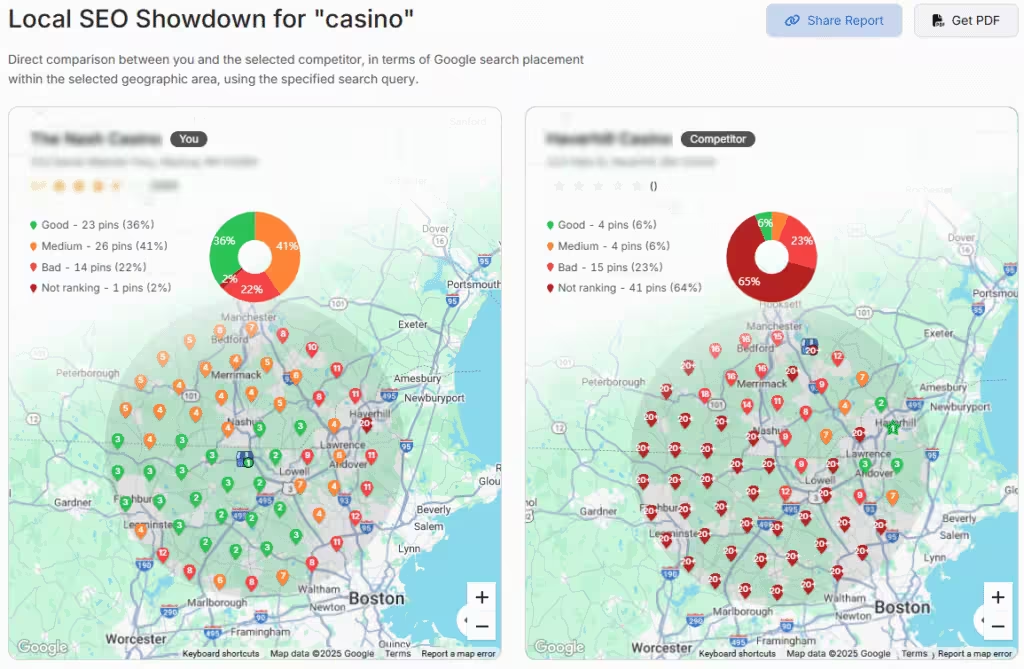
SE Ranking tracks static rankings once per day without verified CTR, no-click, or branded query signals. Search Atlas logs historical shifts across SERP features and auto-updates ranking reports.
Search Atlas, an alternative to SE Ranking, handles both link analysis and acquisition. Search Atlas includes tools for outreach and digital PR syndication, along with the WILDFIRE feature for reciprocal link partnerships. SE Ranking SEO software tracks backlinks but does not support outreach, contact discovery, or placement verification.
Search Atlas is a paid SEO platform with plans starting at $99/month, and it offers a free 7-day trial. All tiers include at least one free OTTO activation. The pricing does not scale based on audits, keyword slots, or backlink rows. SE Ranking splits access across feature caps and usage tiers, which often forces plan upgrades for core workflows.
Pros featured in the Search Atlas SEO tool review include verified rank tracking, AI-powered SEO automation, semantic content optimization, and full local SEO coverage. Every feature runs on one platform, so there is no need for third-party connectors or data patches.
Cons of Search Atlas include a higher learning curve compared to SE Ranking, although one-on-one onboarding and tutorial libraries reduce setup friction for teams.
Search Atlas is the best SE Ranking alternative for SEO professionals who need automation, live GSC insights, and real execution instead of flagged issues. SE Ranking tracks the basics. Search Atlas fixes the system.
2. Semrush
Semrush is a full-stack SEO and digital marketing platform that combines organic search tools with PPC data, content automation, and social media scheduling. Semrush includes keyword research, rank tracking, technical audits, backlink analysis, and competitor monitoring. With add-ons like Trends (Market Explorer and Traffic Analytics), Semrush provides high-level industry insights, market share analysis, and audience demographics.
Semrush is a better alternative to SE Ranking for full-funnel visibility. SE Ranking supports core SEO workflows and social media scheduling but lacks access to PPC keyword insights, display ad tracking, and algorithm volatility monitoring.
Semrush includes all of these features. It tracks 26.6B keywords in 142 countries, logs rank movements daily, and segments keyword intent, SERP features, and traffic share by domain.
SE Ranking updates rankings less frequently and offers fewer keyword filters.
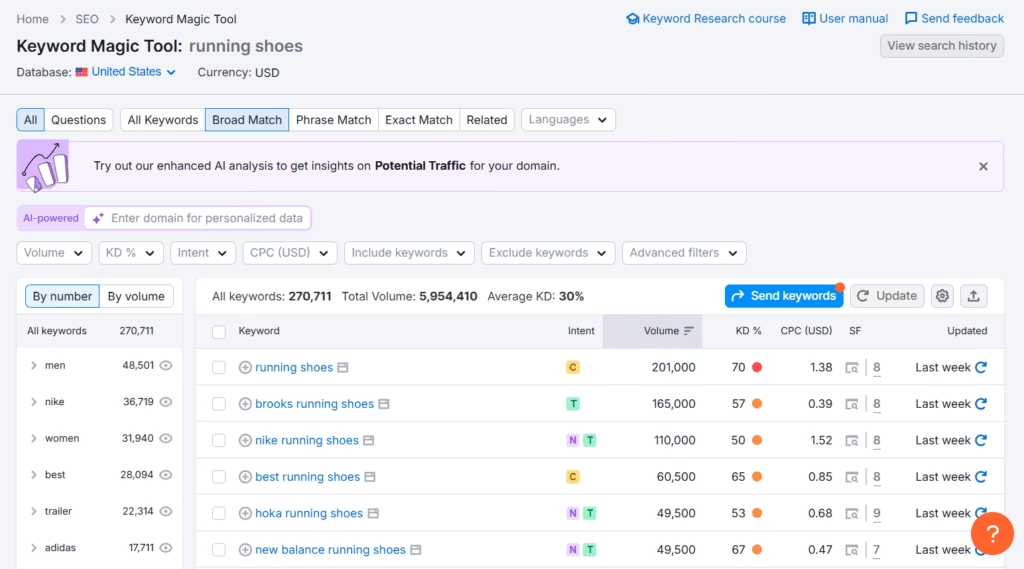
In content workflows, Semrush includes the SEO Writing Assistant, Topic Research, and ContentShake AI. SE Ranking supports keyword-based content scoring but does not include AI content planning or SERP-aligned templates.
For backlink analysis, Semrush provides toxic link scoring, disavow file support, and historical backlink data. SE Ranking includes a toxicity index, but its backlink database remains smaller, and it lacks advanced filters for link type, authority distribution, and anchor context.
Semrush offers broader reporting options, agency dashboards, API access, and multi-user permission controls.
Semrush is a paid platform that goes from $139.95/month and scales to $499.95/month for agency users. Semrush offers a 7-day free trial for Pro and Guru plans, although some advanced features require separate add-ons even during trial access.
For smaller teams considering the value-per-buck and SE Ranking pricing vs. Semrush pricing, Semrush is more expensive and introduces additional costs through add-ons such as Trends and the Agency Growth Kit.
Pros highlighted in the Semrush SEO tool review include access to integrated SEO and PPC tools, granular keyword segmentation, and enterprise-grade reporting. Semrush cons include higher plan costs, upsell requirements, and limited platform flexibility for non-Google ecosystems.
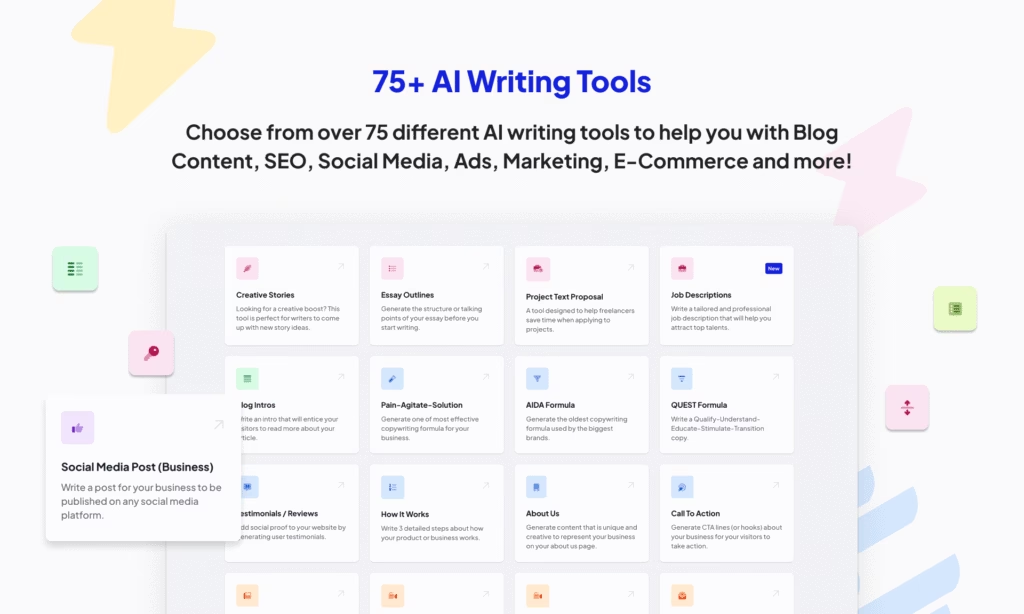
For teams comparing SE Ranking vs. Semrush, Semrush is the better choice for marketers who manage both organic and paid performance and require digital marketing tools that extend SEO capabilities.
3. Serpstat
Serpstat is a regional SEO and growth-hacking platform built for multilingual keyword research, bulk SERP analysis, and domain-level competitor insights. Serpstat supports key SEO functions like rank tracking, site audits, backlink analysis, and keyword clustering, geared toward teams that manage campaigns across multiple regions or verticals.
Compared to SE Ranking, Serpstat is a better alternative for bulk keyword research, regional SERP clustering, and PPC ad analysis. Core features of Serpstat include intent-based keyword grouping, Yandex and Google rank tracking, domain comparison tools, on-page audits, and batch reporting. Team and agency plans unlock advanced exports, white-label reporting, API access, and workspace collaboration.
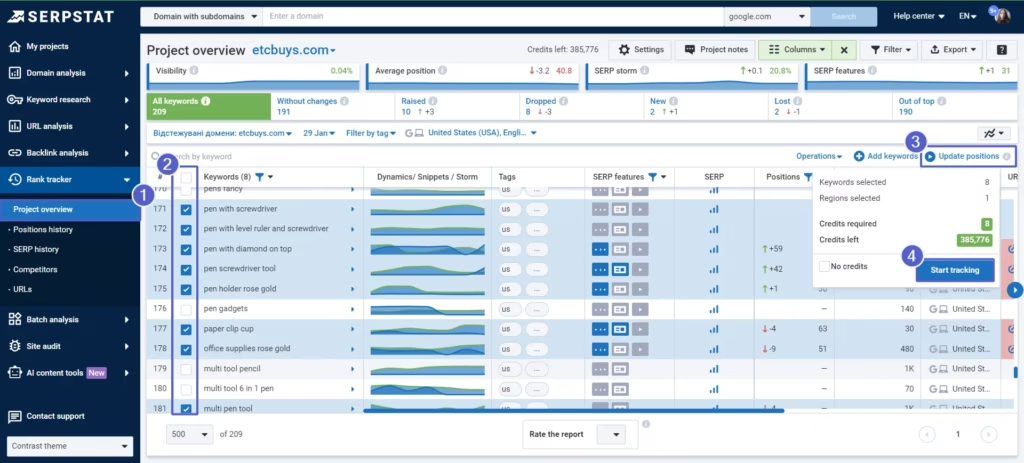
In keyword research, Serpstat allows bulk import of up to 50,000 keywords, cluster segmentation by topic or intent, and local data in over 230 Google regions. SE Ranking supports keyword research in fewer regions and does not include automatic clustering, which makes Serpstat a more scalable SEO software for international projects.
However, SE Ranking outperforms Serpstat in backlink tracking, daily ranking updates (even on lower-tier plans), and built-in UX features like AI Results Tracker, which visualizes changes in SERPs.
Serpstat is a paid platform starting at $69/month. A 7-day free trial is available on Individual and Team plans. Compared to SE Ranking, Serpstat is more expensive at the entry level but includes clustering and PPC tools that SE Ranking only partially covers.
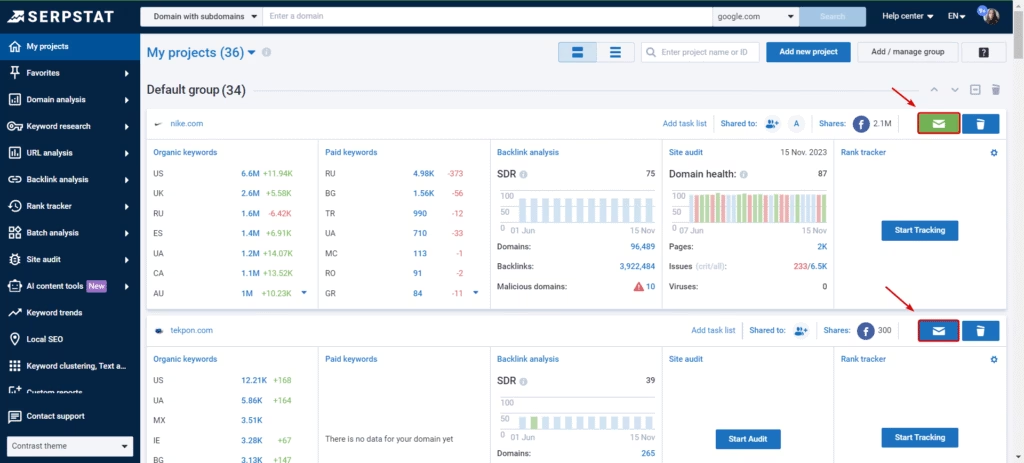
Pros featured in the Serpstat review include scalable keyword clustering, extensive regional database coverage, and robust domain-level competitive insights. Serpstat is especially useful for Eastern European, Asian, and multilingual SEO campaigns where local search behavior varies by language and geography.
Serpstat cons entail a steeper learning curve, fewer daily rank updates on base plans, and a more technical interface during site audits.
For keyword strategists and SEOs considering SE Ranking vs. Serpstat, Serpstat wins on clustering and local market insights, especially in underrepresented or non-English regions.
4. Ahrefs
Ahrefs is an SEO software suite designed for link analysis, content research, and competitor benchmarking. Ahrefs offers core features such as backlink audits, keyword research, rank tracking, and site audits, with a strong emphasis on historical data and proprietary link intelligence.
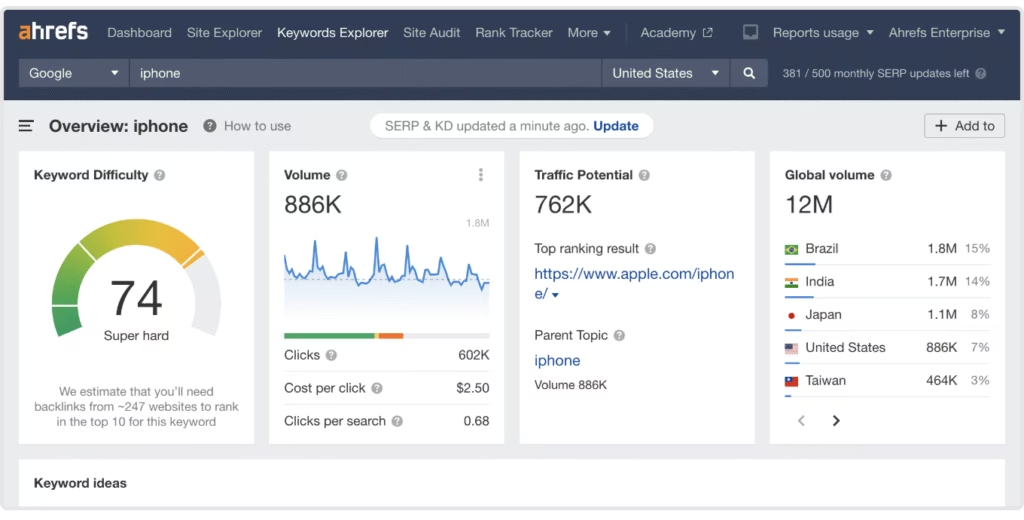
Top features of Ahrefs include Site Explorer for backlink and traffic analysis, Keywords Explorer with clickstream-based metrics, Rank Tracker for multi-device and multi-location SERP data, and Content Explorer for top-performing pages.
Ahrefs supports batch analysis, domain comparison, and link intersect reports. It maintains one of the largest backlink indexes on the market.
Testing SE Ranking vs. Ahrefs, Ahrefs is a stronger alternative for backlink research, historical link trends, and domain-level comparisons. However, SE Ranking is better for daily rank tracking, local SEO visibility, and multi-user campaign workflows.
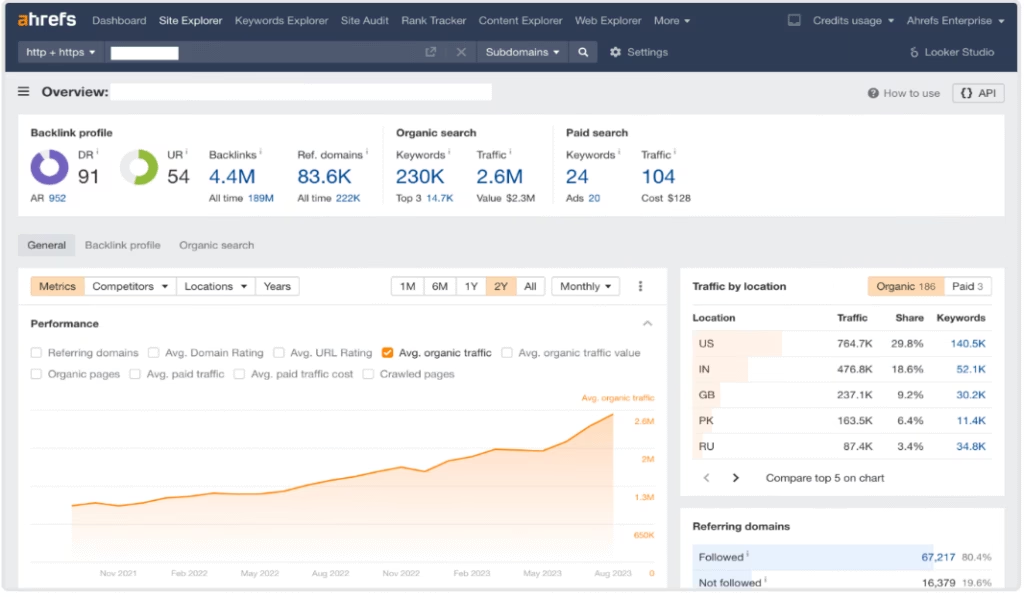
Ahrefs is a paid tool with pricing that begins at $129/month, which makes it about twice as expensive as the SE Ranking entry plan. It does not offer a full-featured free trial, although it offers limited access through free Ahrefs Webmaster Tools. For users comparing value in SE Ranking pricing vs. Ahrefs pricing, SE Ranking delivers more functionality per dollar.
Pros mentioned in the Ahrefs SEO tool review include fast link updates, extensive historical backlink archives, and reliable traffic estimation for competitors.
Ahrefs cons are a rigid pay-per-credit system, no local SEO dashboards, and weekly-only rank updates unless on higher tiers.
Ahrefs is one of the best SE Ranking alternatives for backlink-driven SEO. SE Ranking vs. Ahrefs comparisons often highlight that the SE SEO tool offers more complete coverage for agency and local SEO, while Ahrefs dominates in link intelligence and authority profiling.
Best Alternatives to SE Ranking for Rank Tracking and Local SEO
5. Nightwatch
Nightwatch is an SEO monitoring platform designed for agencies and growth-stage companies that manage complex keyword sets for multiple locations. Nightwatch offers precise daily rank tracking for Google, Bing, YouTube, DuckDuckGo, and Google Local Pack, with city-level granularity in over 190,000 locations.
Nightwatch supports AI search visibility tracking for systems like ChatGPT, Gemini, and Claude, which makes it one of the first tools to incorporate SERP evolution under Google SGE (Search Generative Experience) and LLMs (Large Language Models).
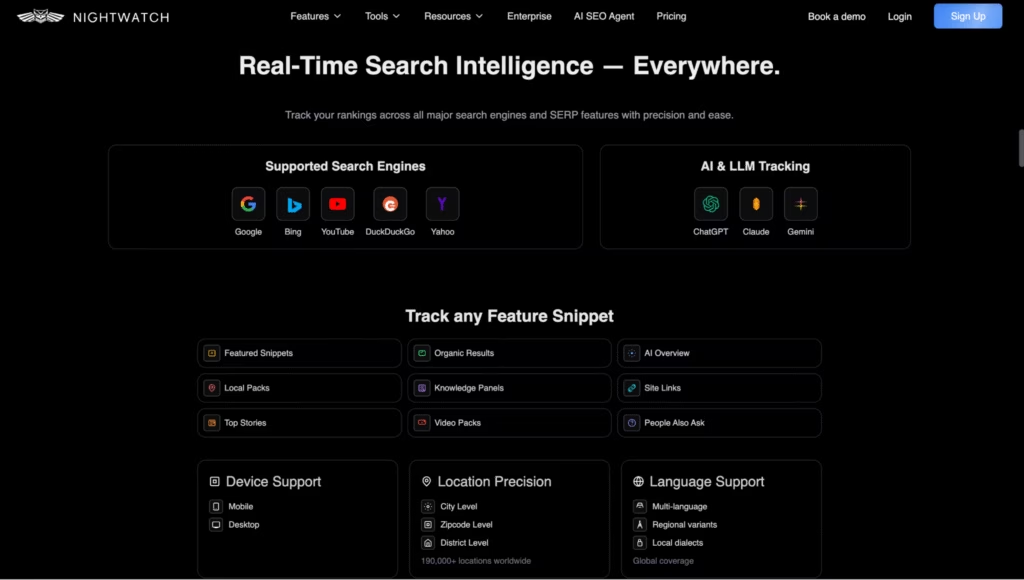
Nightwatch features include a powerful rank tracker, automated white-label reporting, on-page SEO audits, keyword segmentation, and API access. Nightwatch, as an SE Ranking competitor, delivers more advanced metrics such as Click Potential, Volatility Index, and Search Visibility Score.
Unique features like SERP preview by feature type (e.g., local pack vs. organic), zipcode-based filtering, and multi-language support set Nightwatch apart from traditional rank trackers.
Nightwatch is a better SE Ranking alternative for large-scale, location-specific SEO, advanced SERP segmentation, and visual reporting. SE Ranking offers broader capabilities for keyword research, backlink monitoring, technical SEO, and campaign automation. Nightwatch focuses more narrowly on visual clarity, AI tracking, and segment control.
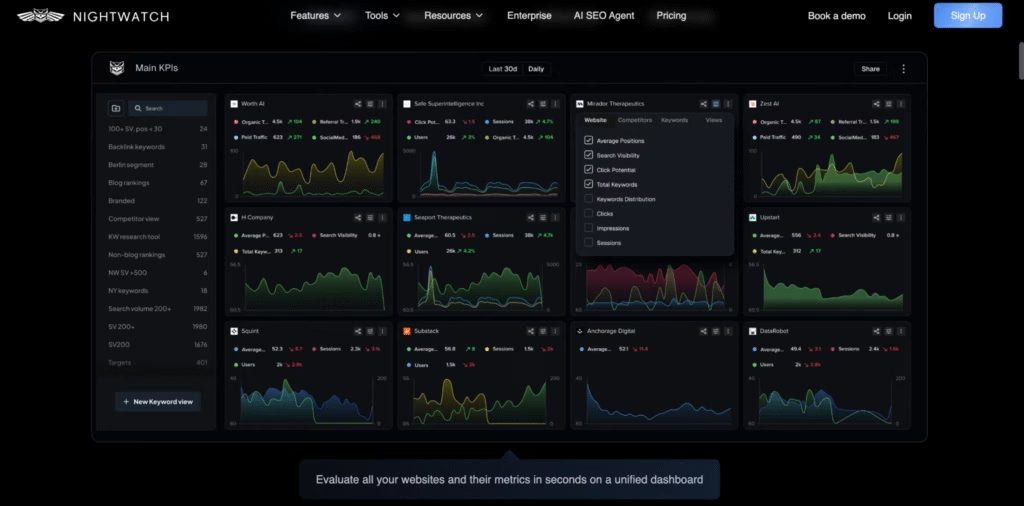
Nightwatch is a cheaper alternative to SE Ranking with plans starting at $39/month for up to 250 keywords. It offers a 14-day free trial, but does not offer a permanent free tier. Nightwatch pricing scales by keyword volume and supports flexible billing with no contract lock-ins.
Pros in the Nightwatch review show superior UI design, reliable rank data, and segmentation capabilities. Common user complaints on Nightwatch include the absence of backlink analytics and a steeper learning curve compared to beginner tools.
SE Ranking vs. Nightwatch comparisons favor Nightwatch for performance-driven teams that prioritize accuracy, visibility, and client-ready reporting.
6. Wincher
Wincher is a lightweight SEO tool designed specifically for keyword rank tracking with daily SERP updates and clean, user-friendly reporting. Wincher SEO tool offers local and mobile rank tracking, instant keyword refresh, basic on-page SEO tips, and simplified competitor tracking.
The Wincher dashboard focuses on visibility, movement, and keyword-level performance, with support for alerts and scheduled reports.
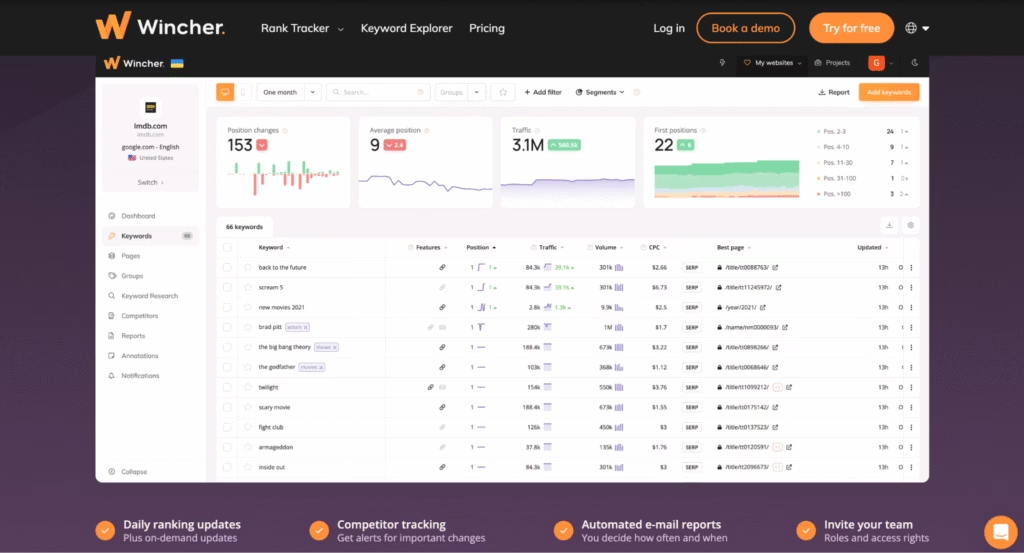
Compared to SE Ranking, Wincher is a better alternative for straightforward rank tracking without complex dashboards or steep learning curves. SE Ranking supports a broader SEO workflow with backlink analysis, technical audits, and content tools, but Wincher excels in speed, usability, and focus.
Wincher is a cheaper SE Ranking alternative with plans starting at 41€/month for 500 keywords and 10 websites. It offers a 7-day free trial with access to all core features.
Pros mentioned in the Wincher review include its intuitive interface, fast setup, and reliable SERP accuracy for solo SEOs and freelancers. Cons of Wincher are limited integrations, no backlink data, and basic competitor tracking, which makes it less suitable for large-scale teams or agencies.
7. AccuRanker
AccuRanker is a real-time rank tracking platform built for SEOs who need instant keyword updates, pixel-level SERP visibility, and advanced segmentation. AccuRanker delivers daily and on-demand rank refreshes, location-level filtering, and proprietary Share of Voice and CTR models. The AccuRanker platform supports multi-engine tracking by country, ZIP code, or device, with integrations into Looker Studio, Google Search Console, and Adobe Analytics.
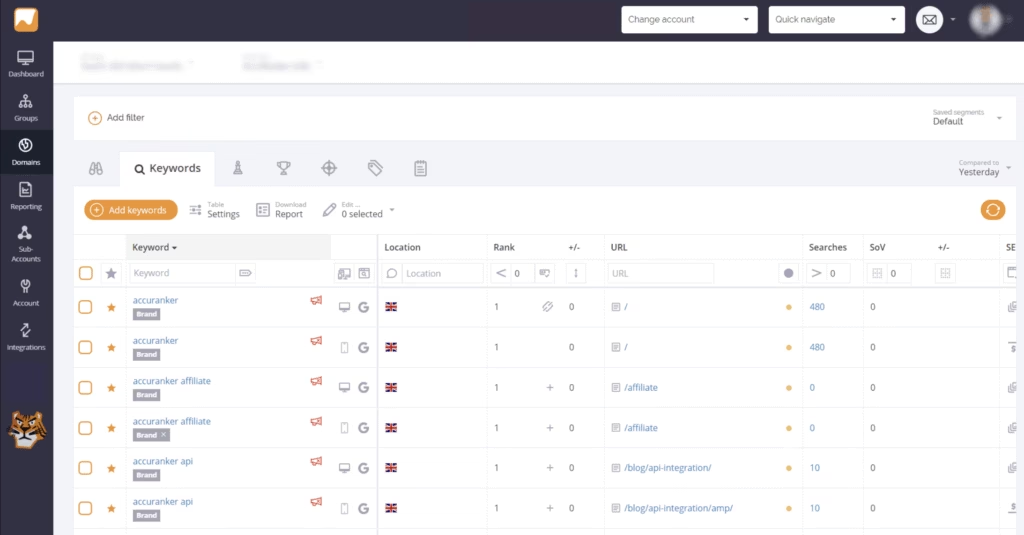
Compared to SE Ranking, AccuRanker is a better alternative for high-speed keyword monitoring and precision rank tracking. SE Ranking software includes broader SEO features like backlink audits, keyword suggestions, and site crawls. But as we compare SE Ranking vs. AccuRanker head-to-head, AccuRanker outperforms SE Ranking in speed, tagging logic, segment-based tracking, and localized SERP analysis.
AccuRanker is a paid-only tool with pricing starting at $129/month for 1,000 keywords. It includes full feature access, unlimited domains, and API availability. No free version is available.
AccuRanker pros are fast and accurate SERP updates, precise local tracking, and reliable CTR estimates by position. AccuRanker cons include a lack of backlink data, no technical audit features, and a higher price point that targets SEO professionals who only need elite-level rank tracking.
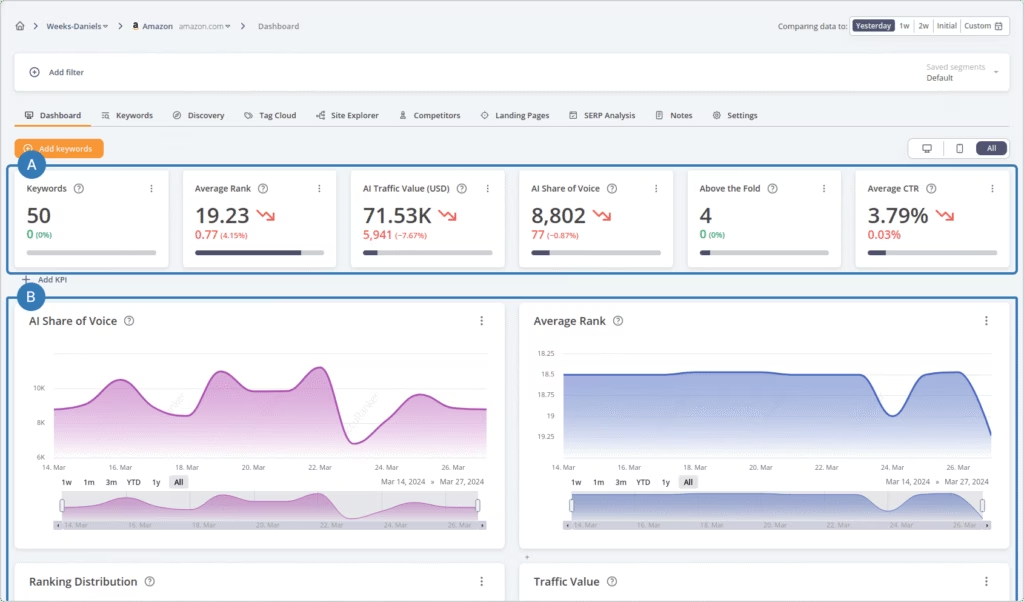
Our AccuRanker review shows it is a useful SE Ranking alternative for enterprise SEO teams and agencies.
Best Alternatives to SE Ranking for Keyword Research and Content SEO
8. Mangools
Mangools is an SEO software suite best known for KWFinder, a user-friendly keyword research tool designed for fast insights and low-competition opportunities. The Mangools platform includes five main tools, which are KWFinder, SERPWatcher for rank tracking, LinkMiner for backlink analysis, SiteProfiler for domain metrics, and SERPChecker for real-time SERP previews.
Compared to SE Ranking, Mangools is a better alternative for keyword research workflows. While SE Ranking provides a broader SEO toolkit (covering audits, backlink tracking, and content tools), Mangools outperforms it in keyword data visualization, difficulty scoring, and long-tail query discovery.
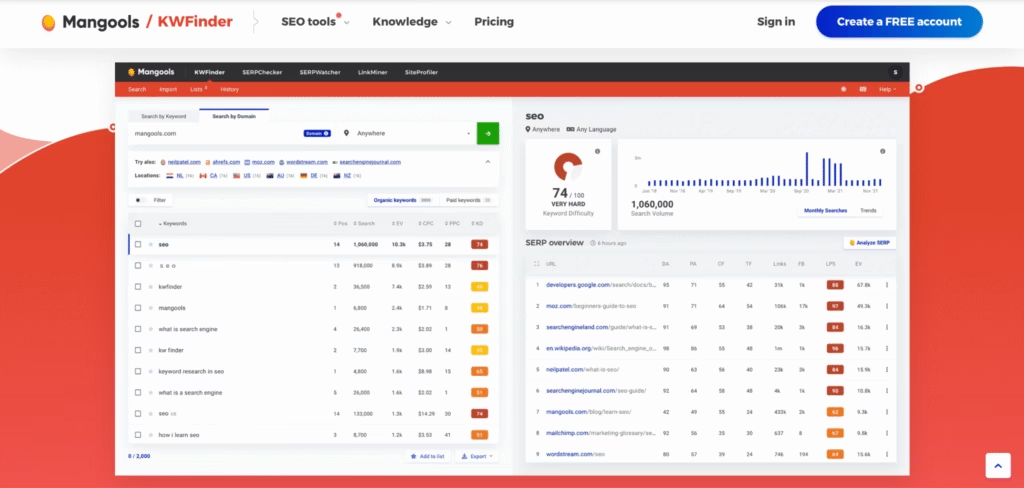
If you test SE Ranking vs. KWFinder, you’ll notice that the SE Ranking keyword suggestion tool covers more regions but lacks the usability and clarity of the UI of KWFinder. Users often compare KWFinder vs. SE Ranking when evaluating keyword accuracy, interface, and ease of use.
The SERPChecker makes Mangools especially valuable for marketers who need to analyze how SERP features like featured snippets or video packs impact visibility.
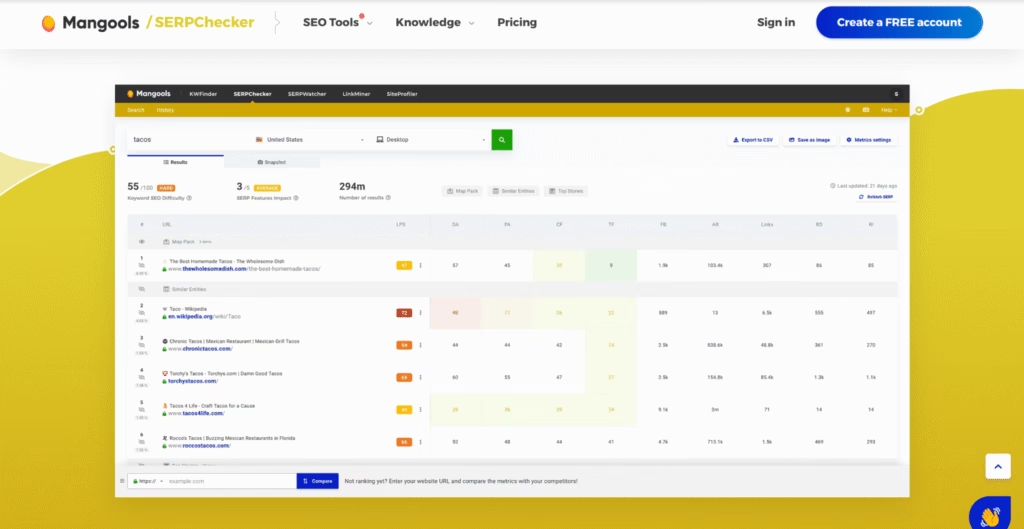
Mangools is a cheaper platform than SE Ranking, with pricing from $29/month, offering a limited free trial with daily usage caps.
Pros included in the Mangools review are its ease of use, visually driven tools, and a smooth transition between keyword research and SERP context.
However, the cons of Mangools vs. SE Ranking are a lack of technical SEO tools, detailed competitor tracking, and scalable reporting, which makes SE Ranking more suitable for agencies or advanced SEO workflows.
9. Keyword Insights
Keyword Insights is a topical authority SEO platform built to streamline keyword discovery, clustering, and content creation. Keyword Insights combines real-time keyword research with intent detection, AI-driven clustering, and automated content briefs to help marketers build comprehensive topic coverage. Unlike traditional rank trackers, Keyword Insights SEO software focuses on what to write, how to structure it, and why it will rank, not just whether it does.
Core features of the Keyword Insights platform include a live keyword discovery engine, a SERP-based keyword clustering tool, search intent identification, and a dual-mode AI content suite with both an Assistant and an autonomous Writer Agent.
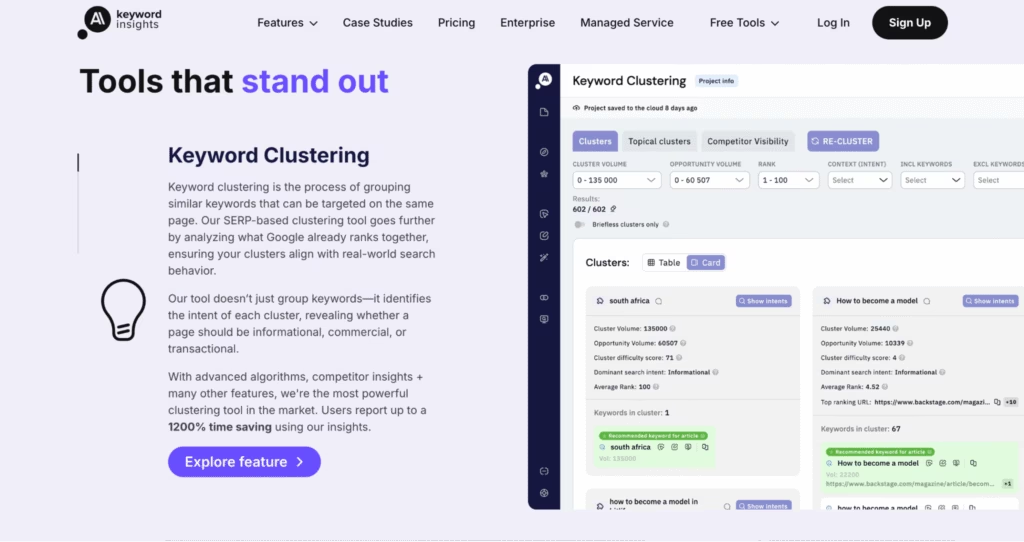
Comparing Keyword Insights vs. the SE Ranking marketing tool, Keyword Insights is a stronger alternative for content planning and keyword clustering, especially when the goal is topical authority.
While SE Ranking keyword suggestion tools and rank trackers support end-to-end SEO campaigns, Keyword Insights outperforms SE SEO in semantic grouping, intent classification, and AI-augmented writing.
When testing SE Ranking vs. Keyword Insights, users often choose SE Ranking for audits and rank data, but rely on Keyword Insights for strategy, briefs, and execution.
Keyword Insights is a cheaper alternative to SE Ranking that starts at $1 for a 7-day trial and transitions into a flexible pay-as-you-go model, with subscription plans available for higher usage. Pricing is credit-based, which allows users to buy specific amounts of clustering, briefs, or writing tasks.
Pros mentioned in the Keyword Insights review are clustering logic, intent tagging at scale, and an AI agent that produces near-ready content drafts.
The main drawbacks of the Keyword Insights tool are limited backlink and rank tracking features, which make it unsuitable as a complete SEO platform.
10. Surfer SEO
Surfer SEO is an AI-powered content intelligence platform designed to optimize web pages based on live SERP data and natural language patterns. Surfer SEO evaluates keyword usage, structure, and semantic relevance to help content rank higher.
Core Surfer SEO features include the Content Editor for real-time scoring, SERP Analyzer for top-page comparisons, and an SEO Audit tool that suggests revisions based on gaps. Surfer offers keyword clustering, internal linking suggestions, and access to Surfer AI for AI-generated drafts aligned with entity-based optimization.
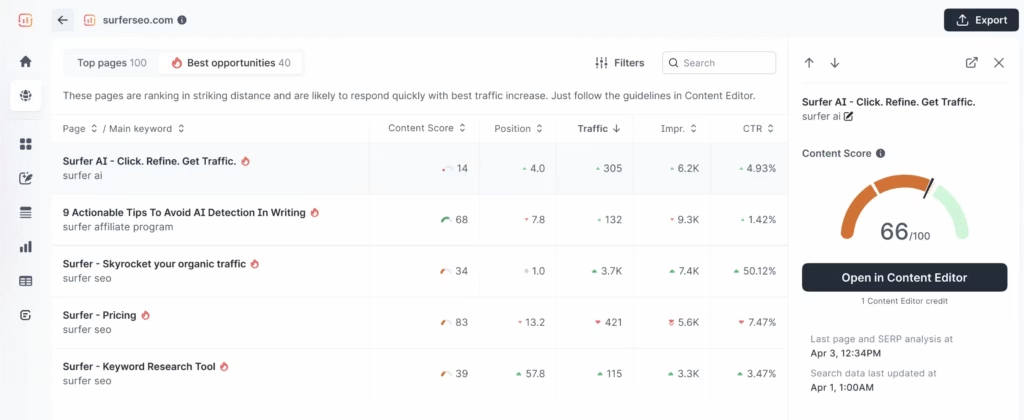
Comparing SE Ranking vs. Surfer SEO, Surfer is a better alternative for on-page content optimization and NLP-based scoring. SE Ranking covers more ground across backlinks, keyword suggestions, and technical site audits, while Surfer goes deeper into content structure, TF-IDF data, and topical coverage.
Surfer SEO is a paid tool with plans starting at $89/month, but Surfer AI access and full content brief generation require higher-tier subscriptions. Unlike SE Ranking, it does not offer standalone rank tracking, backlink audits, or keyword research tools.
Pros in the Surfer SEO review feature precise content scoring, intuitive SERP comparisons, and integrations for collaborative workflows. Surfer SEO cons include high entry-level pricing, limited support for non-content SEO tasks, and dependency on Google data, which may miss nuance in low-competition niches.
In the Surfer SEO vs. SE Ranking comparison, Surfer is the better choice for content teams and agencies that are focused on ranking through semantic relevance.
Best Alternative to SE Ranking for PPC and Competitor Research
11. SpyFu
SpyFu is a keyword and PPC intelligence platform that exposes the full organic and paid search strategy behind any domain. SpyFu specializes in long-term keyword tracking, historical Google Ads data spanning 19+ years, and detailed SERP overlap.
SpyFu lets users uncover every keyword a competitor ranks for, which ads they’ve run for over a decade, and how their bidding and ranking behavior has changed over time.
Core features of the SpyFU software include Google Ads keyword tracking, ad history for every domain, SERP similarity reports, backlink analysis, and keyword grouping. Users can download full PPC competitor campaigns and uncover gaps between paid and organic visibility.
SpyFu is a better alternative for PPC research, keyword history, and competitive intelligence. Contrasting SE Ranking vs. SpyFu, SE Ranking boasts a broad feature set, but it lacks the PPC depth and historical archive that SpyFu offers.
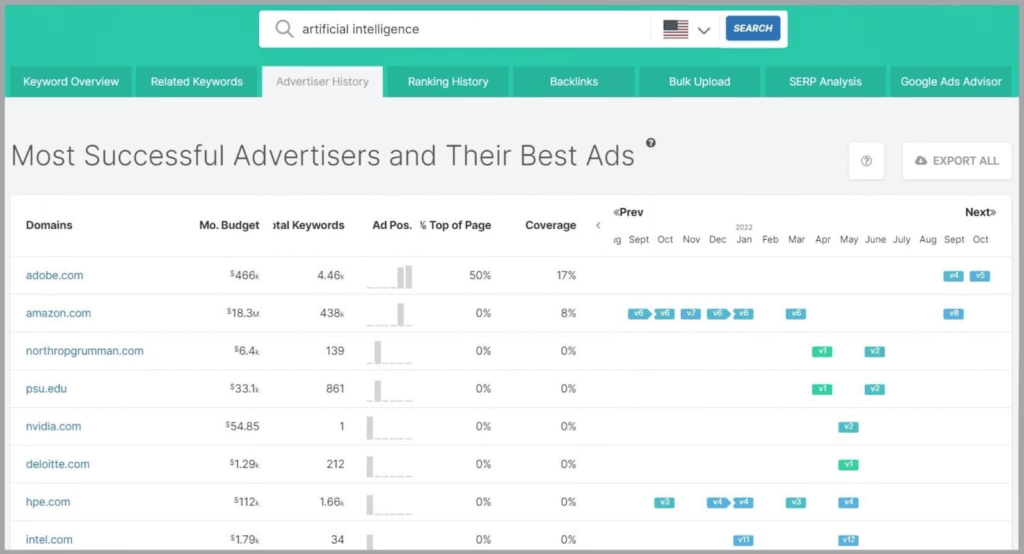
SpyFu Competitor Kombat module simplifies gap analysis between domains across SEO and paid search. Its export capabilities and filtering tools allow for full analysis of keyword trends, bid activity, and SERP overlap at scale.
SpyFu prices are cheaper than the SE Ranking prices, starting at $9/month and going up to $79/month for the professional plan. The RivalFlow AI feature adds AI-powered content guidance, often available via a free trial.
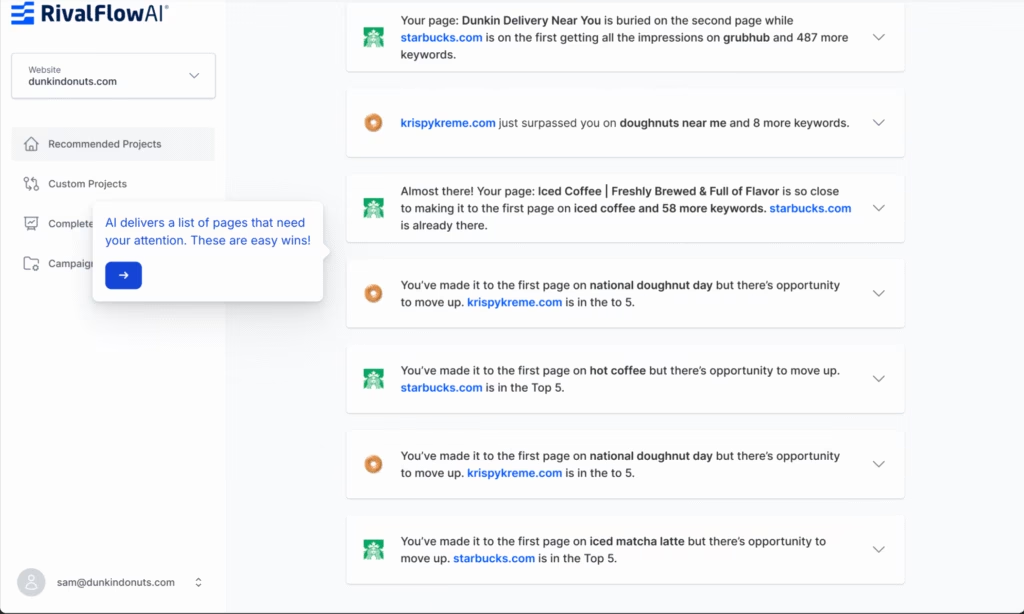
According to the SpyFu review, the advantages of the SpyFu software are unlimited competitor lookups, exportable ad data, and long-term SERP archives. The SpyFu cons include outdated backlink metrics and limited site audit capabilities.
SpyFu is a lightweight but powerful SE Ranking alternative for PPC marketers and competitive SEO research, especially when historical visibility and long-tail opportunities matter more than site diagnostics or content workflows.
Best Alternatives to SE Ranking for Agencies and SEO Reporting
12. AgencyAnalytics
AgencyAnalytics is a white-label dashboard and reporting platform designed for marketing agencies that manage multi-channel SEO and PPC campaigns. Unlike SE Ranking, which includes task execution features, AgencyAnalytics focuses on automated reporting, client dashboards, and cross-platform visibility. Its modular interface supports SEO, Google Ads, social media, call tracking, and email metrics from over 75 integrations.
Key AgencyAnalytics features include drag-and-drop dashboard builders, Google Business Profile insights, rank tracking, backlink monitoring, scheduled email reports, and client login portals.
While the SE Ranking agency pack features prioritize hands-on tools (like content editing, audit workflows, and link tracking), AgencyAnalytics centers on visual reporting and client-facing transparency.
Compared to SE Ranking for agency work, AgencyAnalytics is a better alternative for scalable reporting across clients and marketing channels. The SE Ranking agency pack features offer more tactical tools for campaign execution, but AgencyAnalytics excels in presentation, automation, and client management.
AgencyAnalytics is a paid tool starting at $79/month for a plan that includes 5 clients. It offers a 14-day free trial.
The AgencyAnalytics review mentions pros like low-lift onboarding, custom white-label options, and time-saving report templates. Cons of AgencyAnalytics include basic SEO tools, no AI content assistance, and limited depth in audits or keyword analysis.
Compared to the SE Ranking SEO software suite, which suits execution-heavy teams that manage content workflows, audits, and keyword research directly inside the platform, AgencyAnalytics suits account managers, strategists, and reporting specialists who need to streamline updates for clients without manually digging through multiple tools.
13. WebCEO
WebCEO is a white-label SEO platform built for digital agencies that manage multiple client sites, campaigns, and reports at scale. WebCEO offers an integrated suite of 24 SEO and digital marketing tools that cover keyword research, rank tracking, backlink monitoring, site audits, and competitor analysis.
WebCEO is designed for teams that need branded SEO dashboards, automated reports, and lead generation directly from their websites.
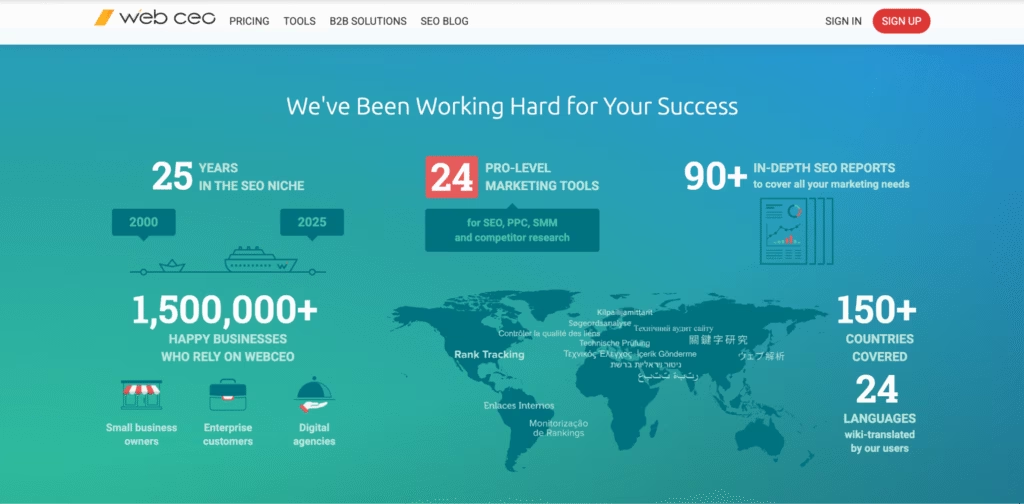
Features of WebCEO include daily or on-demand rank tracking, a keyword suggestion tool, toxic backlink detection, a task manager for issue resolution, and a customizable SEO portal hosted on your domain. SEO agencies assign tasks across teams, generate branded reports, and convert audit data into workflows.
Compared to SE Ranking, WebCEO is a better alternative for white-label SEO, multi-site project management, lead generation, and agency-level reporting. However, if we compare SE Ranking vs. WebCEO directly, SE Ranking outperforms WebCEO in real-time rank tracking, local keyword segmentation, user experience, and daily operational SEO.
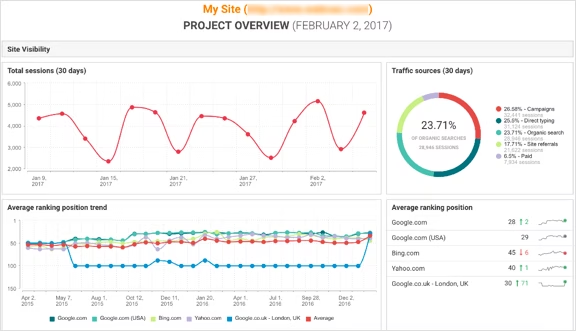
WebCEO is a paid tool with plans from $99/month. It offers a 14-day free trial with full access. While not cheaper than SE Ranking prices, the value of WebCEO lies in its client-facing features, especially for agencies that resell SEO under their brand.
Pros included in the WebCEO review are its full white-label SEO hub, automated client reporting, and built-in lead capture widgets. WebCEO cons are a dated interface, limited support for mobile or local SERP analysis, and a slower UX compared to modern SEO tools like the SE Ranking tool.
WebCEO is a viable (although not lightweight) SE Ranking alternative for mature agencies that need white-label hosting, scalable task assignment, and full-stack SEO tool access under one brand.
Best Alternatives to SE Ranking for Beginners and Small Teams
14. Moz Pro
Moz Pro is a beginner-friendly SEO platform designed for marketers who want simple optimization tools, branded metrics, and high-level visibility reports. Moz Pro covers keyword research, site audits, rank tracking, and link analysis through a clean UI backed by proprietary metrics like Domain Authority and Spam Score. Moz Pro is popular among small businesses and in-house teams that value guided optimization and consistent scoring systems.
Compared to SE Ranking, Moz Pro is a better alternative for branded SEO metrics, onboarding simplicity, and content optimization guidance. Core features include Keyword Explorer, on-page grader, Link Explorer, and weekly rank tracking. Users access custom reports, campaign-level dashboards, and SERP feature tracking.
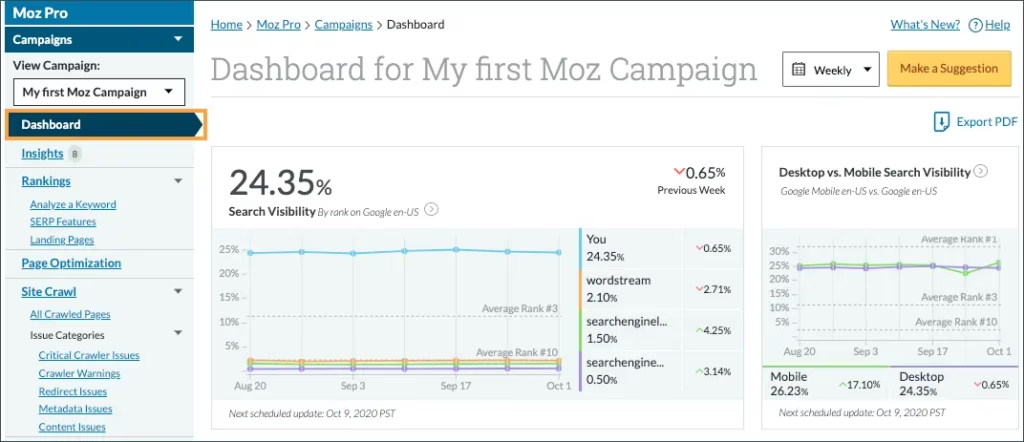
SE Ranking includes more automation, daily rank tracking even at entry level, full backlink toxicity scoring, and content scoring tied to real-time SERPs. Moz updates rank data less frequently and lacks AI content templates, Google Business Profile integration, and local SEO heatmaps unless paired with other Moz tools.
Moz Pro is a cheaper SE Ranking alternative, with a Starter package at $49/month for small businesses or startups with only one website. Moz Pro offers a 30-day free trial on its Starter and Medium plans.
Moz Pro requires tool bundling or upgrades (e.g., Moz Local, STAT) to match the full feature coverage of SE Ranking.
Pros highlighted in the Moz SEO tool review include high-quality keyword suggestions, DA-based link scoring, and an easy onboarding process. Users appreciate its educational tools like Moz Academy, but note that campaign limits, limited update frequency, and lack of automation make it less suited for larger-scale SEO teams.
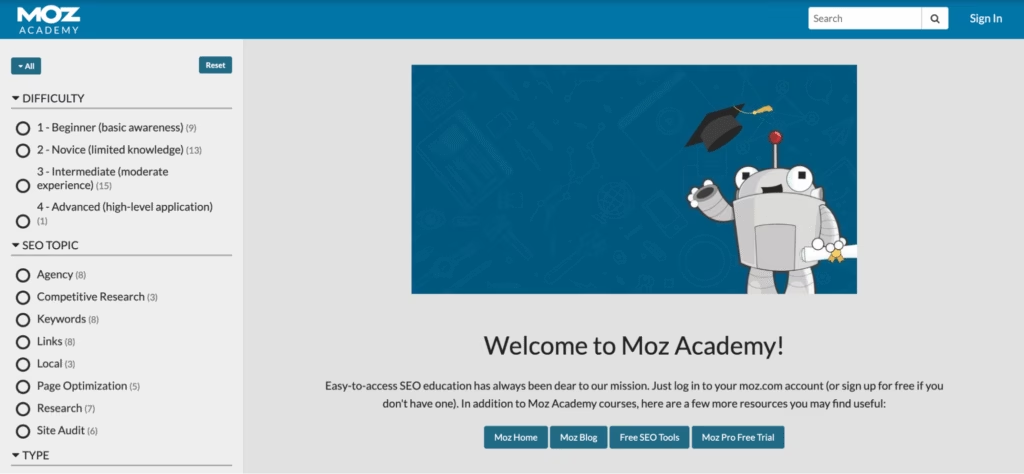
For those comparing SE Ranking vs. Moz, Moz remains a strong choice for small businesses and individuals that benefit from branded SEO metrics, a simple interface, and learning resources.
15. Morningscore
Morningscore is a beginner-friendly SEO tool that turns optimization tasks into a game-like experience, designed to motivate small teams and solo marketers. The Morningscore platform uses a mission-based interface, where users earn points for completing SEO improvements.
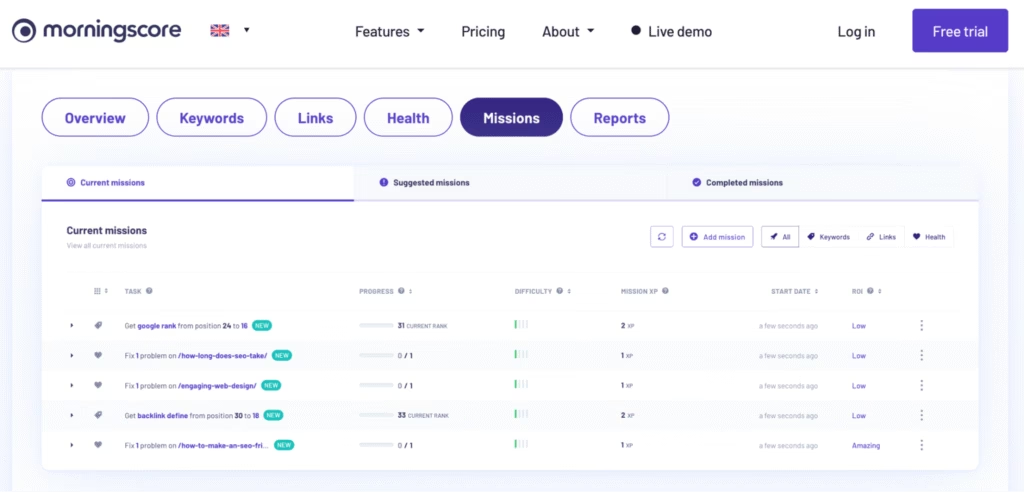
Morningscore tracks rankings, audits websites, monitors backlinks, and suggests keyword opportunities in a lightweight, visual format.
The key features of Morningscore are a single SEO health score, gamified task prioritization, daily rank tracking, competitor comparisons, and a backlink scanner. It simplifies the learning curve and helps users understand SEO impact without advanced dashboards or fragmented tools.
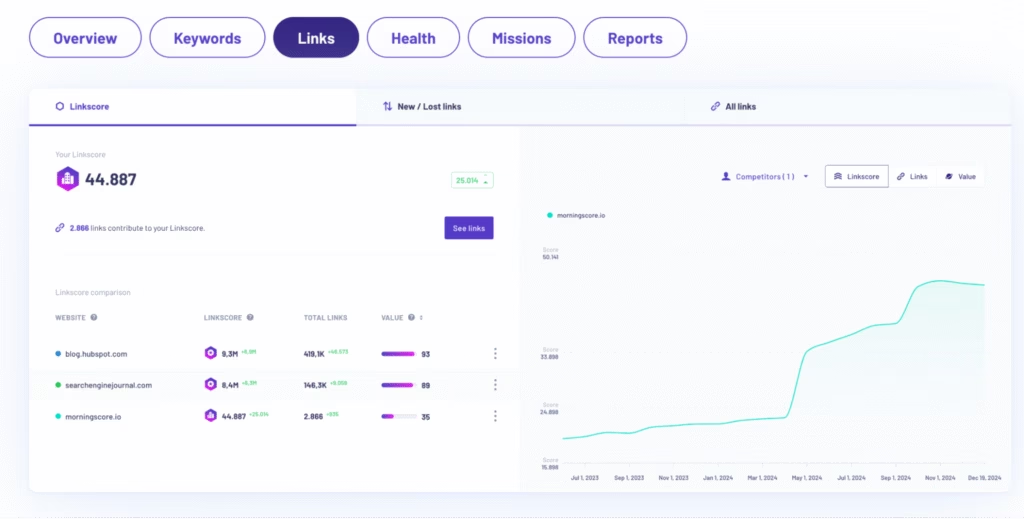
Morningscore, as an alternative to SE Ranking, is better for new users, content creators, and small teams who want encouragement and structure without deep configuration. SE Ranking offers more depth and flexibility, but it can overwhelm non-technical users or those without prior SEO experience.
Morningscore is cheaper than SE Ranking, with pricing that starts at $49/month. It offers a free trial and includes all features in every plan, with usage limits based on tiers.
Pros in the Morningscore review feature a playful UX, clear progress tracking, a low learning curve, and solid SEO fundamentals for websites under 1,000 pages. The cons of Morningscore are limited keyword database reach, fewer integrations, and a lack of advanced audit or content optimization tools.
Why Do People Seek Alternatives to SE Ranking?
People seek alternatives to SE Ranking when they run into limits with its data, accuracy, or pricing.
Many users find that the keyword and backlink databases SE Ranking offers are too small compared to other SEO tools. This makes it harder to do in-depth research or track competitors. Some users report that the SE Ranking data accuracy isn’t always precise. Keywords show different positions than what they see in real searches.
The SE Ranking tool limits keyword intent detection and clustering for topical SEO. It lacks deeper backlink insights or a zero-click SERP simulation.
The user interface of SE Ranking is another issue. While SE Ranking looks clean, people often find it difficult to navigate and slow to load, especially when working on large projects.
Features like historical data, advanced reports, or white-label exports are locked behind higher pricing tiers. What starts as an affordable tool can quickly become expensive if you need more advanced features. SE Ranking Pro offers agency features only in bundled packs with limited flexibility.
Agencies and advanced users often need better tools for client reporting, content optimization, or PPC insights. Many move from SE Ranking to platforms like Search Atlas, SpyFu, or WebCEO. These tools offer more accurate data, deeper insights, and smoother workflows.
In short, users look for SE Ranking alternatives when the platform limits data depth, feature flexibility, or workflow speed, especially for agencies, PPC tracking, and topical SEO.
What to Look for in an SE Ranking Alternative?
The best SE Ranking alternatives fix what SE Ranking limits, omits, or slows down. While SE Ranking is versatile, many users seek alternatives when they hit walls around scale, integrations, or depth in specific features like keyword clustering.
The 10 features to look for in an SE Ranking alternative are below.
- Faster, More Flexible Rank Tracking. SE Ranking updates keyword positions daily, but lacks on-demand refresh, device toggles, or intuitive filtering at scale. Alternatives should streamline UI, enable real-time lookups, and reduce friction across projects.
- Deeper Keyword Research and Clustering. The SE Ranking keyword suggestion tool works, but it doesn’t surface SERP-based clusters or intent-driven groups. Deeper keyword research helps when topical authority and content planning are the focus.
- Semantic SEO Content Scoring. SE Ranking uses basic keyword matching for on-page analysis. Stronger content tools analyze SERP context, entity coverage, and topic structure in the SEO content using NLP or EAV models.
- Stronger Backlink Analysis. SE Ranking includes a backlinks toxicity index, but anchor context, trust scores, and link type filters are limited. Leading SE Ranking alternatives uncover lost, spammy, or high-authority links with deeper link graphs and velocity data.
- Full-funnel Visibility. SE Ranking lacks PPC ad data, keyword profitability scores, and display ad history. Competitor platforms surface both organic and Pay-Per-Click marketing insights for longer timeframes.
- Localized SERP Diagnostics. SE Ranking tracks local rankings, but does not visualize heatmaps, zero-click pack behavior, or device/location splits. Local SEO tools with GBP integration and visual SERP overlays offer clearer insights for map-focused campaigns.
- AI-Powered SEO Execution. SE Ranking flags SEO issues but does not resolve them. Look for platforms that apply optimizations through built-in AI agents or direct CMS/JS integrations.
- Faster UI and Workflow Speed. SE Ranking users report lags on larger datasets. Choose a platform with faster load times, real-time feedback loops, and less friction between audit, edit, and report.
- Scalable Reporting Controls. SE Ranking limits branded exports and custom dashboard logic unless users upgrade. Better tools support modular reporting, multi-client dashboards, and white-label API feeds.
- Transparent Pricing Tiers. SE Ranking restricts access with feature caps and slot limits. Look for tools with clear pricing, full access across plans, and no penalties for scaling content or campaigns.
Which SE Ranking Alternative Offers the Best Balance of Features and Price?
Search Atlas offers the best balance of features and price among SE Ranking alternatives in 2025. Where SE Ranking gates core functionality behind tiered upgrades and feature caps, Search Atlas includes the full SEO and PPC workflow under every plan.
The Search Atlas platform eliminates the need for third-party tools by centralizing strategy, automation, and reporting into one integrated workspace.
Unlike SE Ranking, which surfaces issues but stops short of action, Search Atlas executes optimizations through OTTO SEO. OTTO SEO as an AI assistant audits pages, fixes technical issues, writes and posts content, manages Google Business Profiles, and builds links through a built-in syndication engine.
The value difference becomes even clearer at scale. While SE Ranking imposes limits on keywords, projects, and reports without offering execution capabilities, Search Atlas expands access as usage grows.
Agencies reduce cost-per-site to as low as $39 through bundled activations, while solo SEOs benefit from Search Atlas tools like Content Genius, HARO automation, topical mapping, and real-time GSC-linked rank tracking, all under one login.
SE Ranking serves as a monitoring platform. Search Atlas acts as an execution engine. If you’re looking to replace fragmented tools, remove SEO bottlenecks, and grow traffic with less overhead, then Search Atlas delivers more functionality, better automation, and stronger ROI than SE Ranking without forcing you into upgrade traps or seat-based pricing.
Try Search Atlas free for 7 days and experience what a complete, modern SEO platform can actually do.



